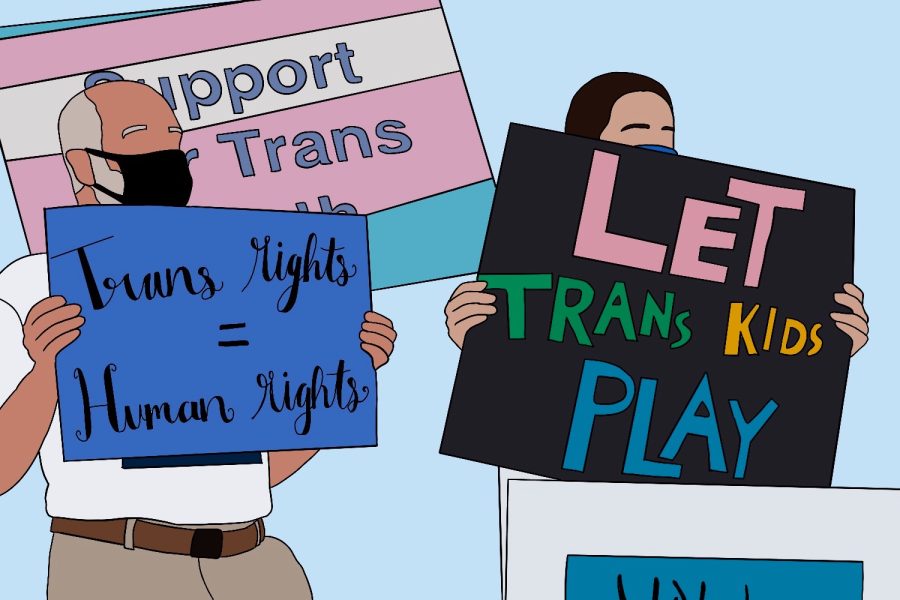Homophobia and Transphobia on the Rise in Legislation: The Iowa Bill
The Iowa Bill, along with Florida’s “Don’t Say Gay” bill, is yet another piece of legislation attempting to limit LGBTQ+ rights.
Mar 17, 2022
The United States has seen an uptick in homophobia and transphobia, particularly on the government’s end. Legislative houses across the nation have attempted, and sometimes succeeded, in passing bills clearly passed against the Lesbian, Gay, Bisexual, Transgender and Queer+ community. On Mar. 8, the Florida Senate approved the “Don’t Say Gay” bill, which prohibits talks about the LGBTQ+ community in the classroom. Just a week earlier, Iowa passed a bill prohibiting transgender women and girls from competing in sports. These bills are spreading around the country and are creating a climate of disrespect towards the LGBTQ+ community’s rights as American citizens.
“The recent anti-LGBTQ+ laws have and are greatly impacting the community. They are dangerous and will only cause discrimination instead of change, which is what is really needed right now,” sophomore Steffi Sarmiento-Mena said.
As though we are moving backward rather than making progress, these bills strategically made certain sections vague and thus broad enough to allow for more discrimination in this so-called “grey area”. Additionally, these new laws are all based on unfounded claims which victimize heterosexual and cisgender people unnecessarily despite no factual evidence.
The governor of Iowa, Kim Reynolds, justified her signature on the bill by suggesting that transgender women and girls cheat when playing sports. She explained that these women were going to be physically superior due to being “males”. Gov. Reynolds then proceeded to slander transgender athletes by repeatedly addressing them as “men”, which perfectly demonstrates the disrespectful way in which Gov. Reynolds sees these women and girls.
“The anti-trans bill is a little complex, I can see that it’s unfair to have now female/male trans people participate in female/male sports, both for the trans people and for their competitors. Yet it’s also unfair to those that are trans, as being trans is their way of being themselves. The difference in the body of a female trans person and a female one is big enough to be called unfair but small enough where it wouldn’t be worth it to make another division, like the Paralympic. in the end both sides have merits but I empathize for the trans’ inability to feel comfortable with their bodies without compromising their interests,” sophomore Roman Padierne said.
Such measures reflect recent initiatives by the governor of Florida. Gov. Ron DeSantis has guaranteed that his signature will be on the “Don’t Say Gay” bill that was just passed by the Florida Senate. All Democrats in the Senate voted against this measure alongside two Republicans, demonstrating that the right to be who you are is not related to partisan affiliation. Gender and sexuality should not be pointed out as right or wrong by the government nor should it be used in political events to gain more support from the far-right. These are issues regarding human rights.
Regarding sexuality and gender, they are both social constructs and do not have to walk hand in hand. Society often puts gender under a binary umbrella of cisgender “man” and “woman”, but it is far more than that. The same goes for sexuality, which is essentially expected to be heterosexuality for all with monogamous couples. These stereotypes and societal ideas are what lead to such laws being passed into law,
In today’s world, it is hard to find a solution to this maze of problems. However, there is one. Right now, education and access to information are necessary to enable people to know that the LGBTQ+ community exists and is just as deserving as its counterparts. The preconceived stereotypes are what lead to the creation of these laws. While conservatives are currently staying relatively mild, not diverging from claims they have made in the past, it will progressively get worse as bans only encourage more bans, not openness and tolerance.












